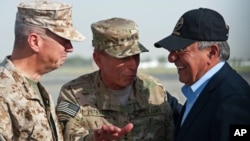Newly appointed U.S. Secretary of Defense Leon Panetta is on a previously unannounced visit to Afghanistan, his first since taking over the defense post on July 1. He says he is optimistic about defeating al-Qaida, and that victory over insurgents in Afghanistan is "within reach."
In the aftermath of the raid that killed Osama bin Laden, Panetta says the United States is closer than ever to "strategically beating" al-Qaida, crippling the terrorist group's ability to stage mass attacks.
Panetta took over at the Pentagon this month after leading the CIA for two and a half years. Speaking with reporters traveling with him to Kabul, he said that if the United States keeps up the pressure, al-Qaida will no longer be able to conduct significant operations. "I think now is the moment - now is the moment - following what happened with Bin Laden, to put maximum pressure on them, because I do believe that if we continue this effort that we can really cripple al-Qaida," he said.
The U.S. defense secretary said that information gained during the raid that killed bin Laden in Pakistan, plus other intelligence the U.S. has collected over years, has resulted in an "active pursuit" of between 10 and 20 terrorist leaders.
Visiting Kabul for the first time since he left the Central Intelligence Agency, Panetta is expected to meet with the U.S. and NATO military commander in Afghanistan, General David Petraeus, who will soon be returning to the United States himself, to take over from Panetta as CIA director.
In addition, Panetta will meet with U.S. Ambassador to Afghanistan Karl Eikenberry, who also is leaving his post by the end of this month.
Those personnel changes closely follow the White House announcement that a phased withdrawal of U.S. forces from Afghanistan is beginning, with 10,000 troops leaving by the end of the year.
Pressure to reduce military spending due to the U.S. economic downturn is one of the factors behind the troop withdrawals, but Panetta said he believes costs can be cut without cutting America'smilitary capability. "I do not believe that you have to choose between fiscal responsibility and a strong national defense. I believe that we can achieve savings and have a strong defense force at the same time," he said.
The new defense secretary went on to echo his predecessor, Robert Gates, who expressed concern that excessive cuts could "hollow out" the U.S. military.
The Pentagon chief also intends to meet with Afghan President Hamid Karzai in Kabul. The U.S. relationship with Mr. Karzai has been strained for years, and the Afghan president has complained strongly about civilian casualties in his country caused by coalition airstrikes. Panetta said he is optimistic that a new U.S. military and civilian leadership team in Afghanistan can mark a new beginning in the nations' partnership.
New US Defense Chief Optimistic About Defeating al-Qaida













